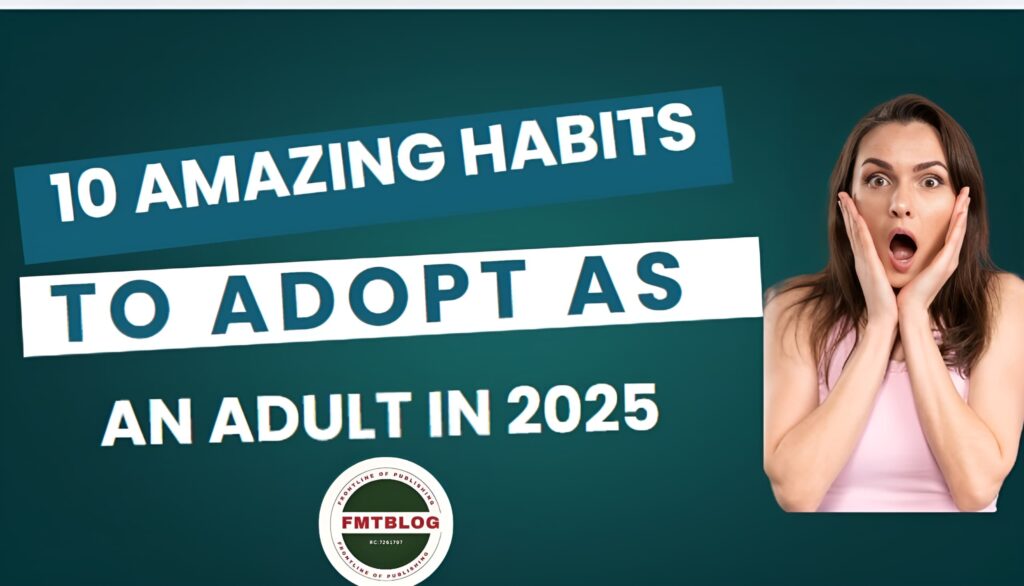Health
10 Amazing Habits To Adopt As An Adult In 2025: Must Read
Discover 10 amazing habits to adopt as an adult in 2025 to boost productivity, health, and happiness. Redefine your life goals with this must-read.

Hurray! It’s almost halfway into January 2025, which started a few minutes ago.
Before I formally delve into the topic of ’10 amazing habits to adopt as an adult in 2025.’ I would like to say that these habits are things that sleep and wake up every morning with us.
Mastering adulthood is a continuous process of trial, adjustment, and growth. 2025 promises new opportunities and challenges for young professionals and career-driven individuals seeking to enhance and improve their lives.
Adopting 10 amazing habits that align with evolving personal and professional landscapes can significantly influence your life and career trajectory.
This article highlights 10 amazing habits that will help you focus on productivity, personal growth, and well-being in 2025. Whether striving for career advancement, financial stability, or holistic self-improvement, these practical habits will set you on the right path.
Table of Contents
Start Your Day with Intentional Morning Affirmations

Most mornings, we are so engrossed with only how we intend to get to work rather than how we can achieve more with less stress. Affirmations, especially in the morning, brighten our day.
Mornings often set the tone for the entire week at large. By implementing affirmations and intentional routines, you can boost focus and productivity.
Here are a few steps to develop these 10 amazing habits:
- Wake up at least 30 minutes earlier to avoid rushed mornings.
- Include practices like mindful journaling, planning your daily priorities, or enjoying a quiet breakfast.
- Consider fitness activities such as stretching or yoga to nurture the body, affirmations, and mind.
While adjusting to earlier wake-up times may take effort, this habit reduces stress and enhances energy levels.
Caution: Avoid immediately jumping into emails, social media feeds, or reactive tasks. These activities may hijack your focus early in the day.
Prioritise Lifelong Learning

The fast pace of technology and shifts in industries demand continuous upskilling. Lifelong learning equips you with tools to remain relevant and adaptable in 2025.
Recommended Action Plan:
- Allocate 15–30 minutes daily to online courses, podcasts, or books.
- Choose learning platforms like Coursera, Khan Academy, or Udemy for expertise in specific fields.
- Subscribe to newsletters or industry forums to stay updated on trends.
By fostering intellectual growth, you enhance your marketable skills and stimulate innovation.
Risk: One common hazard is information overload, so focus on specific topics to maintain clarity and comprehension.
Invest in Physical and Mental Fitness

A sustainable balance between work, health, and leisure improves long-term outcomes. Physical and mental health require equal attention for overall well-being.
Steps Towards Integration:
- Engage in at least 150 minutes of moderate exercise weekly. This could include brisk walking, cycling, or strength training.
- Dedicate time to mental fitness through mindfulness meditation, setting mental boundaries with work, or consulting experts if required.
Small steps toward fitness can yield significant benefits over time, reducing the likelihood of stress-related health conditions.
Note: Overexertion when introducing new routines can result in burnout or injuries. Begin moderately and progress steadily.
Build a Digital Detox Habit
With technology deeply integrated into daily life, proactive disconnection is essential to maintain focus and mental clarity.
How to detox effectively:
- Introduce screen-free hours, particularly before bed or during meals.
- Use tools such as screen timers or app blockers to manage device usage.
- Replace digital distractions with offline hobbies, such as journaling or reading books.
This small behavioural change significantly improves sleep quality, interpersonal relationships, and overall satisfaction.
Cautionary Tip: Gradually reduce device usage instead of enforcing sudden, unrealistic time-offs, which may lead to frustration.
Automate and Streamline Financial Management
Financial literacy continues to be a crucial skill for young professionals. Automating certain aspects of your finances removes stress and ensures consistency.
Steps for Effective Management:
- Use apps like YNAB or Mint to track expenses and create budgets.
- Automate actions such as bill payments, investment contributions, and savings deposits.
- Conduct quarterly reviews to assess your financial goals.
This prescriptive approach safeguards you against pitfalls like overspending or delayed bill payments.
Risk: Overreliance on automation without periodic checks may lead to errors. Monitor automated actions regularly.
Develop Stronger Networking Habits
Networking is a fundamental component of professional advancement. Establishing genuine connections ensures sustained relationships and access to new opportunities.
Practical Networking Tips for 2025:
- Attend at least 3 industry-specific events annually, such as conferences or webinars.
- Utilise LinkedIn strategically by sharing insights, engaging with posts, and messaging contacts.
- Join professional associations or niche online communities.
Networking fosters both mentorship opportunities and cross-functional learning experiences.
Warning: Over-networking for transactional purposes (solely for personal gain) often leads to weak, superficial interactions. Invest in genuine, mutual relationships.
Maintain a Gratitude Practice
Gratitude has been closely linked to higher levels of happiness and emotional health. Regular practice shifts your mindset from scarcity to abundance.
Key Ways to Practice Gratitude:
- Maintain a gratitude journal to record 3 daily things you’re thankful for.
- Verbally express your appreciation to colleagues, peers, or loved ones.
- Reflect on how obstacles taught you critical lessons.
This habit strengthens your emotional endurance and enhances life satisfaction.
Cautionary Advice: Avoid generalised statements. Focus on specific events/factors to deeply internalise gratitude.
Simplify Your Life with Minimalism
Minimalism involves eliminating excess and focusing on what genuinely adds value. Its benefits aren’t limited to physical spaces and possessions but also mental clarity.
How to Start:
- Declutter your immediate spaces (closets, desks, redundant apps).
- Create a top 3 priorities list daily to reduce unnecessary multitasking.
- Purchase items based on necessity and long-term usage.
Minimalism brings mental focus, reduces decision fatigue, and aligns your environment with your values.
Risk: Extreme minimalism may disrupt practical life requirements. Balance simplicity with functionality.
Practice Effective Time Management
Time is consistently among the most limited resources for professionals. Cultivate skills that maximise your productivity without compromising personal time.
Strategies to Implement:
- Adopt techniques like time-block planning or Pomodoro cycles.
- Use actionable trackers like WorkFlowy or Notion to align commitments with timelines.
- Schedule breaks intentionally for optimal time utilisation.
Streamlined management prevents burnout while ensuring greater task execution quality.
Risk Highlight: Avoid overpacking daily schedules, which may hinder flexibility and adaptability.
Contribute to Community Initiatives
Supporting causes larger than personal gains nurtures altruism and creates fulfilling connections.
Action Items:
- Identify time (or funds) for local charity events, social programs, or volunteering acts.
- Leverage professional platforms for mentorship schemes.
- Take part in initiatives related to sustainability and inclusion.
Activities surrounding collective objectives foster meaning and enrich the overall perspective.
Caution: Select initiatives that authentically align with your interests to avoid a sense of obligation fatigue.
Build 2025 with Purpose and Persistence
Every habit implemented over time compounds into significant shifts in mindset, health, and achievements. By adopting these 10 habits, you’re equipping yourself to thrive personally and professionally in 2025.
Positive transformation doesn’t happen overnight—but with steady, deliberate actions, you’ll forge the path toward becoming the best version of yourself.
For actionable insights tailored to your needs, explore our free Habit Development Toolkit and redefine success on your terms.
JOIN THE CONVERSATION→ Telegram | X/Twitter | Facebook | WhatsApp|WhatsApp Channel|Mobile App|Instagram
FAQs (Frequently Asked Questions)
Why are habits so essential for adults?
Habits streamline daily decisions, reducing stress while making routine tasks more efficient. They encourage productive behaviours and consistency.
How long does it take to develop a new habit?
Research indicates a habit can take anywhere from 21 to 66 days to form, depending on its complexity and individual commitment levels.
How can I track my progress effectively?
Tracking tools like habit trackers, digital apps (e.g., HabitBull), or visual cues (habit calendar) can be used to monitor and reflect on consistency.











